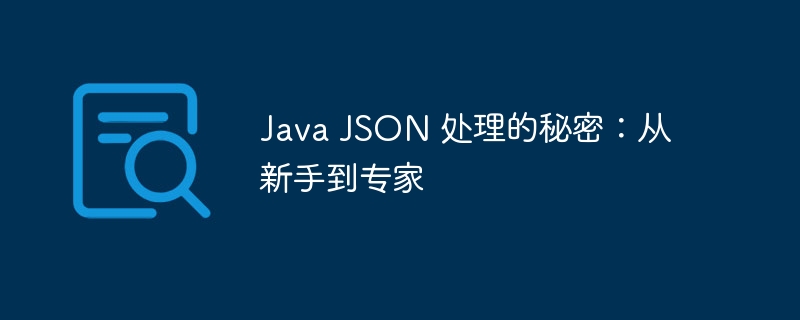Home >Java >javaTutorial >Secrets of Java JSON Processing: From Novice to Expert
Secrets of Java JSON Processing: From Novice to Expert
- WBOYWBOYWBOYWBOYWBOYWBOYWBOYWBOYWBOYWBOYWBOYWBOYWBforward
- 2024-03-09 09:30:15887browse

php Editor Banana reveals the secrets of Java JSON processing for you: from novice to expert. As a data exchange format, JSON's processing in Java is crucial. This article will start with basic concepts and gradually introduce the methods and techniques of using JSON in Java, helping readers gradually become experts from novices. By in-depth understanding of JSON processing methods, readers will be able to apply JSON in Java development more flexibly and efficiently, achieving convenient and stable data interaction.
JSON (javascript Object Notation) is a lightweight data exchange format widely used in WEB and in mobile applications. It is a text-based data structure represented as objects and arrays of key-value pairs. In Java, jsON serialization and deserialization provide the ability to convert between Java objects and JSON representations.
Best Practices for JSON Serialization in Java
- Use third-party libraries: Libraries such as Jackson and Gson provide out-of-the-box serialization and deserialization capabilities and support rich functionality.
-
Specify fields: Use the
@JsonPropertyannotation to specify the fields to be serialized to control JSON output. -
Ignore fields: Use the
@JsonIgnoreannotation to ignore fields that do not require serialization. -
Custom serialization and deserialization: Customize the serialization and deserialization process by implementing the
JsonSerializerandJsonDeserializerinterfaces.
Custom serialization and deserialization
In some cases, you may need to customize the serialization or deserialization process. For example, you might want to serialize a specific field in a different format, or deserialize it into a custom object.
Use Jackson custom serialization:
@JsonSerialize(using = CustomDateSerializer.class) private Date date;
Use Gson custom deserialization:
class CustomDateDeserializer implements JsonDeserializer<Date> {
@Override
public Date deserialize(JsonElement json, Type type, JsonDeserializationContext context) {
// 将 JSON 字符串解析为 Date 对象
return Date.parse(json.getAsString());
}
}
Use third-party libraries
Jackson and Gson are two popular libraries for JSON processing in Java. They both offer a wide range of functionality and Performance Optimization.
Jackson:
- Flexible configuration options
- Support custom serialization/deserialization
- high performance
Gson:
- Simple api
- Suitable for simple JSON processing scenarios
- Excellent performance
Select third-party library
Which library to choose depends on your specific needs. Jackson is suitable for complex scenarios that require a high degree of configurability and custom functionality. For simpler JSON processing scenarios, Gson may be a better choice.
Using third-party library examples
Use Jackson to serialize objects:
ObjectMapper mapper = new ObjectMapper(); String json = mapper.writeValueAsString(user);
Deserialize JSON using Gson:
Gson gson = new Gson(); User user = gson.fromJson(json, User.class);
in conclusion
By mastering the tips and techniques of Java JSON processing, you can seamlessly exchange data in web and mobile applications. By using third-party libraries, custom serialization and deserialization, and other best practices, you can easily process JSON data and create robust and efficient applications.
The above is the detailed content of Secrets of Java JSON Processing: From Novice to Expert. For more information, please follow other related articles on the PHP Chinese website!

